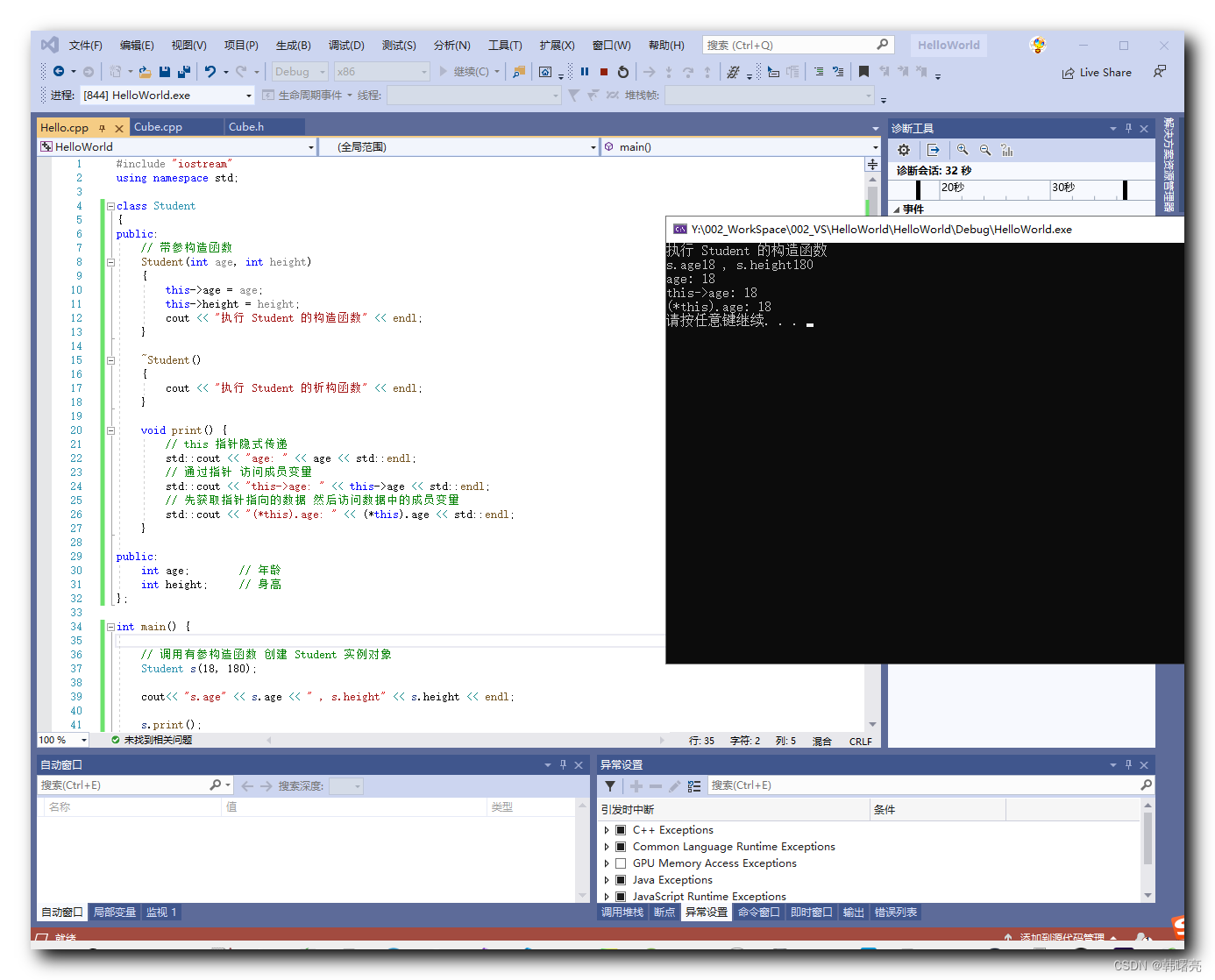-
【C++】C++ 类中的 this 指针用法 ① ( C++ 类中的 this 指针引入 | this 指针用法 | 代码示例 )
一、C++ 类中的 this 指针
1、C++ 类中的 this 指针引入
在 C++ 类中 , this 指针 是一个特殊的指针 , 由系统自动生成 , 不需要手动声明定义 , 在类中的每个 非静态成员函数 中 , 都可以调用 this 指针 ;
this 指针 是指向 调用对象 自身 的指针 , 也就是调用 该成员函数 的 实例对象 的 内存地址 ;
由于 this 指针只能在 非静态成员函数内部使用 , 因此 this 指针是类内部使用的指针 , 使用 this 可以访问 实例对象 中 的所有 公有 public / 保护 protected / 私有 private 成员 ;
2、C++ 类中的 this 指针用法
C++ 类中的 this 指针用法 :
- 使用 this 作为指针 : 在 非静态成员函数 中 , 直接使用 this 作为 本实例对象 的指针 ;
this- 1
- 使用 this-> 访问成员变量 : 在 非静态成员函数 中 , 直接使用如下语法 , 访问 本实例对象 中的 非静态成员变量 ;
this->成员变量名- 1
- *使用 (this). 访问成员变量 : 在 非静态成员函数 中 , 直接使用如下语法 , 访问 本实例对象 中的 非静态成员变量 ; 先获取指针指向的数据 然后访问数据中的成员变量 ;
(*this).成员变量名- 1
在 C++ 类中 , 定义了 成员变量 age 和 height , 在 构造函数 中进行初始化 , 可以使用 this-> age 访问 age 成员变量 , 使用 this->height 访问 height 成员变量 ;
在下面的代码中 , 参数名称也是 age 和 height , 与 成员变量名称重名了 , 使用 this 指针可以有效区分 函数参数 与 成员变量 重名的问题 ;
使用 代码 this->age = age; 为 age 变量赋值 , this->age 是成员变量 , age 是函数的参数 ;
示例代码 :
class Student { public: // 带参构造函数 Student(int age, int height) { this->age = age; this->height = height; cout << "执行 Student 的构造函数" << endl; } void print() { // this 指针隐式传递 std::cout << "age: " << age << std::endl; // 通过指针 访问成员变量 std::cout << "this->age: " << this->age << std::endl; // 先获取指针指向的数据 然后访问数据中的成员变量 std::cout << "(*this).age: " << (*this).age << std::endl; } public: int age; // 年龄 int height; // 身高 };- 1
- 2
- 3
- 4
- 5
- 6
- 7
- 8
- 9
- 10
- 11
- 12
- 13
- 14
- 15
- 16
- 17
- 18
- 19
- 20
- 21
- 22
- 23
- 24
3、完整代码示例
在下面的代码中 ,
构造函数 Student(int age, int height) 的 参数名为 age 和 height ,
成员变量为 int age 和 int height ,
public: int age; // 年龄 int height; // 身高- 1
- 2
- 3
正好 , 成员变量名称 与 参数名相同 , 这里使用 this 关键字 , 可以解决名称冲突的问题 ;
代码示例 :
#include "iostream" using namespace std; class Student { public: // 带参构造函数 Student(int age, int height) { this->age = age; this->height = height; cout << "执行 Student 的构造函数" << endl; } ~Student() { cout << "执行 Student 的析构函数" << endl; } void print() { // this 指针隐式传递 std::cout << "age: " << age << std::endl; // 通过指针 访问成员变量 std::cout << "this->age: " << this->age << std::endl; // 先获取指针指向的数据 然后访问数据中的成员变量 std::cout << "(*this).age: " << (*this).age << std::endl; } public: int age; // 年龄 int height; // 身高 }; int main() { // 调用有参构造函数 创建 Student 实例对象 Student s(18, 180); cout<< "s.age" << s.age << " , s.height" << s.height << endl; s.print(); // 控制台暂停 , 按任意键继续向后执行 system("pause"); return 0; }- 1
- 2
- 3
- 4
- 5
- 6
- 7
- 8
- 9
- 10
- 11
- 12
- 13
- 14
- 15
- 16
- 17
- 18
- 19
- 20
- 21
- 22
- 23
- 24
- 25
- 26
- 27
- 28
- 29
- 30
- 31
- 32
- 33
- 34
- 35
- 36
- 37
- 38
- 39
- 40
- 41
- 42
- 43
- 44
- 45
- 46
- 47
- 48
执行结果 :
执行 Student 的构造函数 s.age18 , s.height180 age: 18 this->age: 18 (*this).age: 18 请按任意键继续. . .- 1
- 2
- 3
- 4
- 5
- 6

-
相关阅读:
基于音频SOC开发板的主动降噪ANC算法源码实现
基于springboot+vue 农业资源管理系统java
Evil.js
Django:二、模板、静态文件及请求相应
【C++要笑着学】Functor 仿函数 | 模拟实现 stack & queue | 模拟实现优先级队列
B. Permutation Chain
算法通关村第五关-二叉树遍历(层数优先)之经典问题:简单的层序遍历、层序遍历分层、自底向上的层序遍历
hive on spark 的架构和常见问题 - hive on spark 使用的是 yarn client 模式还是 yarn cluster 模式?
Linux进程控制
数据分析总结
- 原文地址:https://blog.csdn.net/han1202012/article/details/133252002
